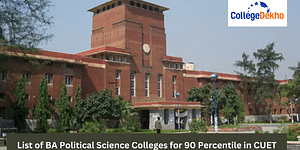Table of Contents
Govt. V.Y.T.PG. Autonomous College Campus
This college is like an Oasis in the Desert. The teachers of this college are well reputed in their field and are pious mission to inoculate the air of dynamism among the students who are mostly from weaker section. Large numbers of alumna and alumnus from this college are working in the reputed fields in Government and Corporate sectors.
Students Activities & Clubs
The National Service Scheme (NSS) is an Indian government sponsored public service program conducted by the Department of Youth Affairs and Sports of the Government of India. Popularly known as NSS, the scheme was launched in Gandhiji's Centenary year, 1969. Aimed at developing student's personality through community service, NSS is a voluntary association of young people in Colleges, Universities and at +2 level working for a campus-community linkage. The first duty of the students should be, not to treat their period of study as one of the opportunities for indulgence in intellectual luxury, but for preparing themselves for final dedication in the service of those who provided the sinews of the nation with the national goods & services so essential to society
The cardinal principle of the programme is that it is organised by the students themselves and both students and teachers through their combined participation in social service, get a sense of involvement in the tasks of national development. Besides, the students, particularly, obtain work experience which might help them to find avenues of self-employment or employment in any organisation at the end of their university career.
OBJECTIVES
-
understand the community in which they work;
-
understand themselves in relation to their community;
-
identify the needs and problems of the community and involve them in problem solving process.
-
develop among themselves a sense of social and civic responsibility.
-
utilize their knowledge in finding practical solution to individual and community problems.
-
develop competence required for group living and sharing of responsibilities.
-
gain skills in mobilizing community participation.
-
acquire leadership qualities and democratic attitude;
-
develop capacity to meet emergencies and natural disasters.
-
practice national integration and social harmony.
NCC Club -
NCC
About National Cadet Corps (NCC)
National Cadet Corps is a Tri-Services Organization comprising the Army, Navy and Air Force, engaged in grooming the youth – 'The Leaders of Tomorrow' – into disciplined and patriotic citizens. National Cadet Corps(NCC) is a premier youth organisation which functions directly under the Ministry of Defence. It functions at a National level to train the young boys and girls to be better citizens and future leaders of our country.
Inception & Growth of NCC
The NCC has its genesis in the University Corps (UC) which was created under the Indian Defence Act, 1917, with the objective of making up the shortages in the Army. In 1920, when the Indian Territorial Act was passed, the University Corps was replaced by the University Training Corps (UTC). In 1942, the UTC was renamed as the University Officers' Training Corps (UOTC). A Committee under Pandit H N Kunzru was set up in 1946 at the behest of the first Prime Minister Pandit Jawaharlal Nehru. The recommendations of this Committee paved the way for the formation of NCC. Thus, the National Cadet Corps (NCC) came into existence on 15 July 1948 under the National Cadet Corps Act (No.XXXI of 1948) enacted by the Parliament.
In 1949, the Girls Division was raised in order to give equal opportunities to school and college going girls.The NCC was given an inter-service image in 1950. when the Air Wing was added, followed by the Naval Wing in 1952.In the same year, the NCC curriculum was extended to include community development / social service activities as a part oft he NCC syllabus at the behest of Late Pandit Jawaharlal Nehru who took keen interest in the growth of the NCC. Presently, NCC has approximately 13 Lakhs Cadets under its fold.
Aims of NCC
To develop character, comradeship,discipline, leadership, secular outlook, spirit of adventure and the ideals of selfless service amongst the youth of the country.
To create a human resource of organised,trained and motivated youth, to provide leadership in all walks of life and be always available for the service of the nation.
To provide a suitable environment to motivate the youth to take up a career in the Armed Forces.
Motto
The motto of NCC is "Unity and Discipline". 'Unity' implies our basic oneness, the brotherhood of all the Indian people regardless of their caste, colour or creed. Likewise, 'Discipline' is the very bedrock on which any nation is founded. It is for these reasons that "Unity and Discipline" has been adopted as motto of the NCC.
Women Empowerment Club -
Women and Internal Complaints Cell
Followingthe 1997 Supreme Court Judgment in the case of Vishakha and others and as perthe directives of UGC and Pt. Ravi Shankar Shukla University, Raipur (Chhattisgarh),the Women Cell has been constituted in our college to uphold the dignity ofwomen at work place by developing a conduciveatmosphere on the campus, where the status of woman is respected and they aretreated with .Pursuant of the Directives of “The Sexual Harassment of women at workplace(Prevention, Prohibition and Redressal) Act 2013, notified by the Ministry ofLaw and Justice which has come into effect from 23rd April 2013, theInternal Complaints Cell has also been established.
Mission -
-
Toprovide a respected identity to women and to help maintain a harmoniousatmosphere at the Institute to enable women to pursue their work with dignityand reassurance.
Objectives –
-
Tocreate awareness amongst students about the problems faced by women of allstrata due to gender issues.
-
Tocreate an environment of gender justice where men and women work together witha sense of personal security and dignity.
-
Tocreate awareness amongst students about the issues related to youth, girls inparticular.
-
Todisseminate knowledge about rights and laws related to women.
-
Tocreate a sense of responsibility in the students and have healthy study andwork culture in college.
-
Toenhance the self-esteem and self-confidence of girl students, women faculty andthe employees.
-
Todevelop critical thinking ability of students.
Women Cell –
The women cell of college has been dealing with problems ofgirl students and women employees of college and has also been organizingawareness activities and workshops/ lectures for women’s welfare.
Govt. V.Y.T.PG. Autonomous College Reviews
Infrastructure: The college campus boasts a satisfactory infrastructure. Certain classrooms may be slightly less roomy in comparison to others, and the allocation of classrooms is subject to chance. The campus provides Wi-Fi access for official purposes, and additionally, houses a well-equipped library.
Hostel: They Provide separate college for the both girls and boys. Rooms of the college is good as well as washrooms are clean. Mess food is tasty. Medical facilities is also availbale.
Infrastructure: Cover college provides excellent infrastructure labs, classrooms library are excellent. The quality of the food in the mesh and canteen is good. Medical facilities are available
Hostel: The hostels of Govt VYTPG Autonomous College is very big We have neat and clean rooms which is clean day by day And we have common area and common bathroom, which is clean day by day by the staff And the mesh provided good food. The warden is very strict about the rules of the hostel
Infrastructure: In our college feud, 49 classrooms, a auditorium whole a seminar hole a reading room facility a central instrument lab for research, Tissue culture lab and other chemistry lab, physics lab, etc There are also a library, a playground
Hostel: In our college, there are separate boys hostel and girl hostel. They are very, pretty much clean There are common bathroom and commn area which is kept clean everyday
Infrastructure: The facilities and infrastructure available in my course are very good. Wi-Fi and classrooms are both available. The food quality available in the canteen is so tasty and healthy. Medical facilities are not present in my course, and sports are available.
Hostel: There was only veg meals available. They were provided 2 type of food per meal. Everything is unlimited. The food was very good and hygiene. The room size was much more spacing for 2 people.
Related Questions
Govt. V.Y.T.PG. Autonomous College QnA
What are the various facilities available on campus at Govt. V.Y.T.PG. Autonomous College , Durg ?
Admission Updates for 2025
Nehru Arts and Science College
Coimbatore (Tamil Nadu)
Rajasthan Swayat Shasan Mahavidyalaya
Jaipur (Rajasthan)
Mats University
Raipur (Chhattisgarh)
Shri Rawatpura Sarkar University
Raipur (Chhattisgarh)
Bharti Vishwavidyalaya, Durg
Durg (Chhattisgarh)








